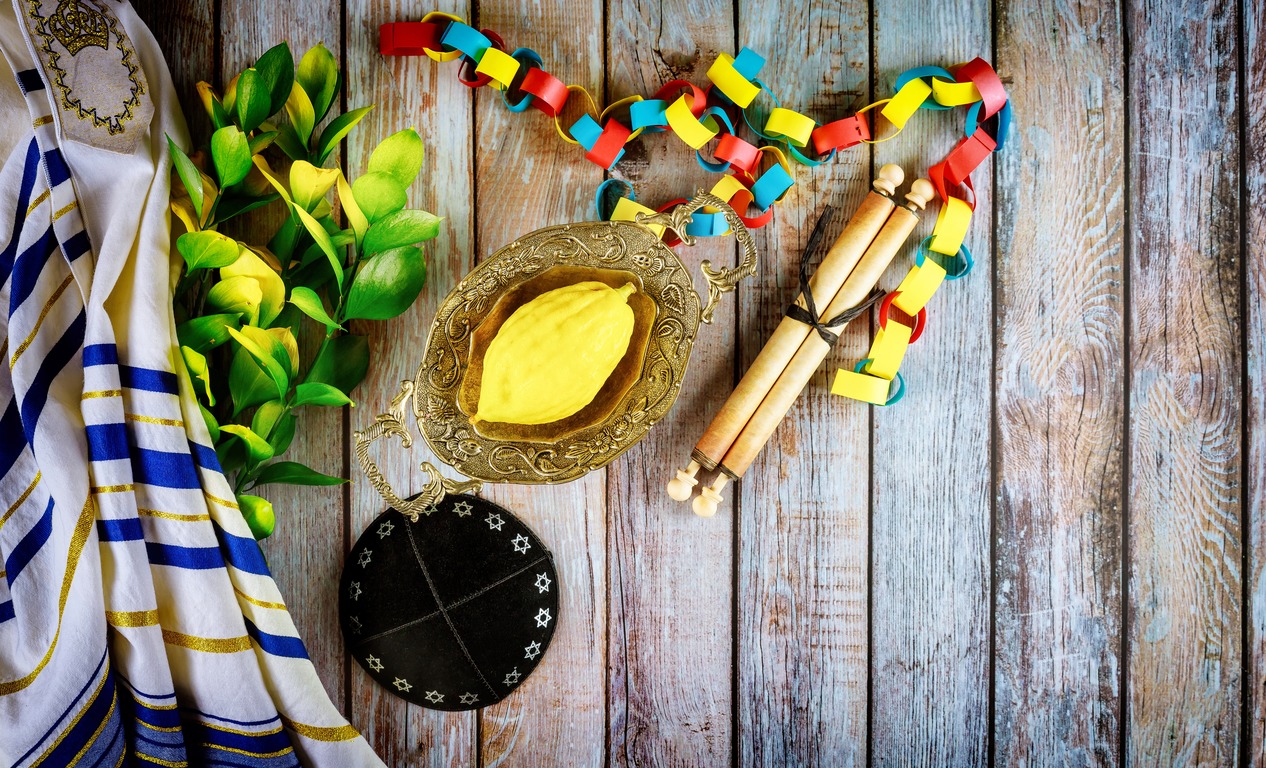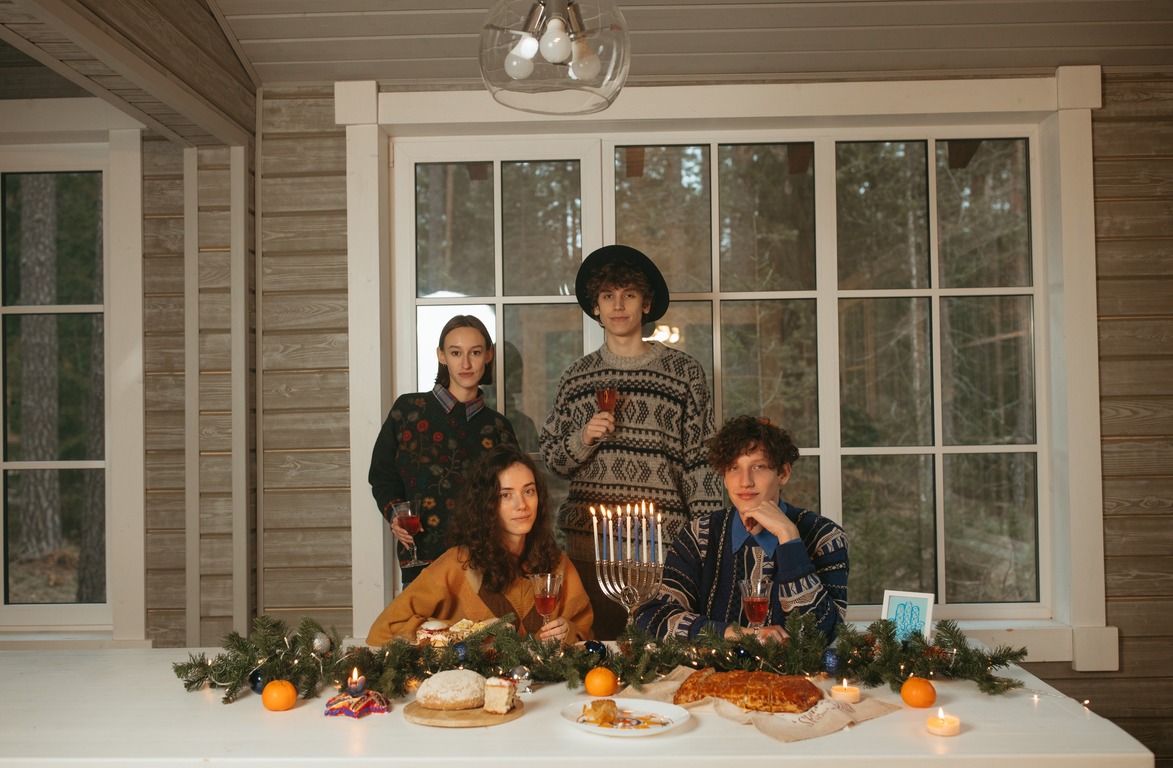Have you noticed some Jews working hard during the month of September building small huts in their balconies, backyards and terraces? They are preparing for their fall harvest festival. The festival of Sukkot, also known as the Feast of Tabernacles or the Festival of Booths, is one of the most joyous and festive occasions in the Jewish calendar.
The festival has agricultural roots dating back to biblical times where the Jews stayed in small huts called sukkah to gather the fall harvest. This Feast of Booths in the Bible also commemorates the 40 years of survival of the Israelites through the wilderness after escaping slavery from Egypt.
During the festival, the Jews build and dwell in the small huts and have their meals inside them. They also shake the four chosen species of plants, which include willow, palm, myrtle and citron, to represent the bountiful harvest. If you plan to celebrate Sukkot on a destination place like Poconos, then HolidayKeepers offer luxury kosher vacation rentals to celebrate together with your friends and family.
History and Origin of Sukkot
In this section, let us know more about the history and origin of the Sukkot festival. The festival traces its roots back to ancient Israelites. During the exodus from Egypt, the Israelites had to wander the wilderness for 40 years and had to set up temporary booths or huts called sukkah. According to the Torah, God had made the Israelites live in these sukkahs when they were freed from the slavery in Egypt. God wanted future generations to know about this through the celebration of this festival.
In terms of agricultural significance, the feast of sukkot was celebrated to commemorate the harvest season and serve as a time of thanksgiving for the bountiful blessings of the land. The Jews used to gather their harvest bounty in the sukkahs. The Israelites had suffered slavery at the hands of Egyptians and were later freed from this. They journeyed through the wilderness for 40 years residing in the temporary huts or sukkahs. This connects sukkahs to the festival and associates the festival to one of the three pilgrimage festivals in ancient Israel.
Significance of Sukkot
The most important thing about Sukkot is that it’s a harvest festival. It celebrates the bounty of the harvest and gives thanks to God for providing us with everything we need. Jews traditionally build a sukkah, a temporary booth or hut, to commemorate this.
The Sukkot Feast of Tabernacles is a time when Jews living in the diaspora (a scattering of Jews throughout the world) return to their ancestral homes to celebrate with their families. It’s a time of joy and thanksgiving, and it’s a chance for us to come together as a community and celebrate our shared faith.
Customs and Traditions
Here, let us get to know the customs and traditions observed during the festival. This is a festival that is celebrated for seven days by the Jews. A number of customs and traditions are observed during the Sukkot Feast of Booths. The central practices that define the festival’s celebration are building and dwelling in a sukkah, shaking the Four Species, and reciting special blessings each day of the festival.
The mitzvot of Sukkot commands Jews to build and dwell in a sukkah during the festival. This serves as a reminder of the Jewish homes of antiquity. These sukkahs can be built yourself or bought online or in a local store.
Another tradition is the waving of the Four Species. The Four Species comprise of lulav (palm branch), hadas (myrtle), Aravah (willow) and etrog (citron). These are waved in all six directions — forward, backward, right, left, up and down — after reciting a special blessing each day of the festival in order to symbolize the presence of the Divine everywhere. However, the waving of the Four Species is avoided on the Shabbat.
In addition to this, there are a few additional items associated with Sukkot customs. These include inviting guests to the sukkah called Ushpizin, decorating the sukkah with festive decorations, and engaging in joyful celebrations and meals with family and friends. The objective is to spend as much time as possible inside the sukkah.
Symbolism and Spiritual Themes
The Jewish Feast of Sukkot has several symbolisms and spiritual themes inherent in it. Let us now delve into the deeper meanings behind its rituals and practices. The sukkah is symbolized as a temporary dwelling. This represents the fragility and impermanence of life as well as the divine protection and shelter provided by God. It shows that instead of focusing on our physical needs or riches, we must remember that everything truly is from and belongs to God.
The Four Species are symbolized to represent the four types of Jews who have different levels of knowledge and observance of Torah. The waving of the Four Species is accompanied by reciting special blessings for Sukkot. The citron represents the one who studies Torah and also obeys the mitzvot. The lulav is the one who studies the Torah but does not fulfil the mitzvot. The Hadas represents the one who obeys the mitzvot but does not study Torah while Aravah is the one who neither studies the Torah nor fulfills the mitzvot. Bringing them together is a sign of unity among the diverse Jewish people.
Celebrations and Festivities
The joyous celebrations and festivities that accompany Sukkot in the Bible showcases the vibrant and communal nature of the festival. The Jews exhibit a lively atmosphere characterized by singing, dancing, and feasting in the sukkah, as well as participating in special synagogue services and community gatherings.
The Sukkot holiday traditions are celebrated in diverse ways by Jewish communities across different cultures and regions from around the world. In some suburban communities in the world, it is customary to build the sukkah with a family fight. In England, they always eat inside the house as it is always raining. Canadians use heating in their sukkahs while Floridians use air-conditioning. The Ashkenazi Jews use the Seven Species of Israel for sukkah decorations and rituals.
All in all, the celebration of Sukkot festival can have diverse traditions. But, it is above all a festival of joy and community. No matter the tradition followed, this festival brings happiness to Jews all over the world.
Apart from this, there are several other Jewish festivals that are celebrated by Jews around the world. Check out our blog post on Jewish festivals to know the significance of these festivals.
Modern Observance and Contemporary Relevance
Sukkot celebration has continued relevance in contemporary Jewish life through the modern observance of the festival, despite changes in agricultural practices and living conditions. Nowadays, Sukkot is observed in innovative ways such as eco-friendly sukkah designs, virtual sukkah hops, and social justice initiatives that are focused on addressing homelessness and housing insecurity. The enduring significance of Sukkot as a time of gratitude, celebration, and spiritual renewal, encourages us to embrace the festival’s timeless teachings and values into our lives.
Conclusion
The Sukkot Jewish holiday festival is one of the most joyous festivals for Jews that is meant to bring friends, families and communities together. It is a celebration of the bountiful fall harvest and commemorates the miraculous hand of protection of God provided to Israelites after they left Egypt. The festival has a rich history, joyful celebrations and meaningful customs.
Immerse yourself in the spirit of the Sukkot holiday, whether through building a sukkah, shaking the Four Species, or simply reflecting on the themes of gratitude, unity, and divine protection that define the festival. I hope that this guide has provided valuable insights and inspiration for experiencing the joy and blessings of Sukkot to the fullest. Wish you all a Chag Sameach!
If you are interested in visiting Poconos for an amazing vacation, HolidayKeepers offer a variety of luxury homes and vacation rentals to help you with your accommodation. The rentals have ample amenities so that you experience a convenient vacation. Get in touch with us to know more about this.




